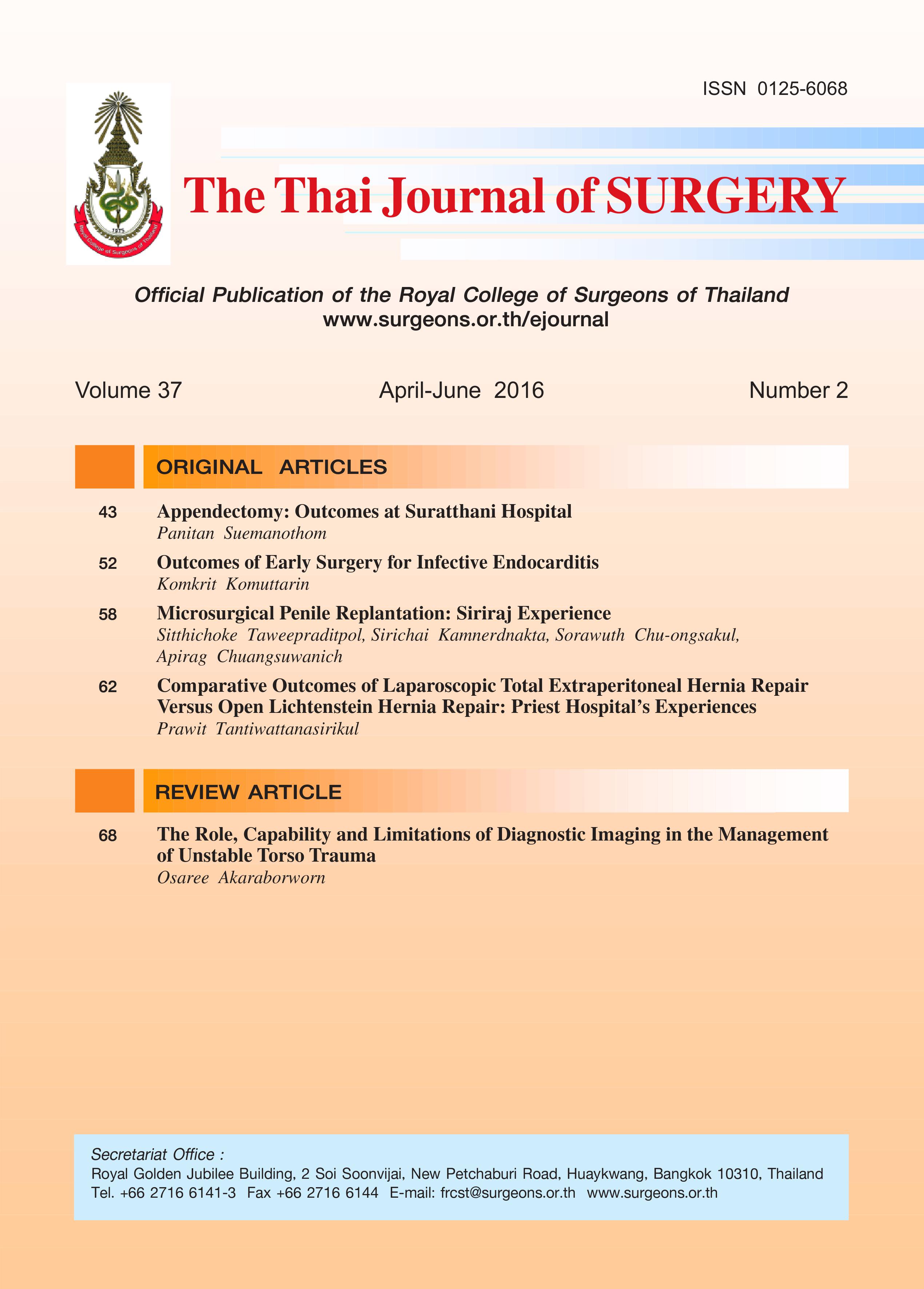Appendectomy: Outcomes at Suratthani Hospital
Keywords:
Appendectomy, appendicitisAbstract
Background: Appendectomy is commonly encountered by general surgeon. Also quite common are perforated appendicitis and negative appendectomy, which are undesirable outcomes of appendectomy.
Objective: To evaluate the outcomes of appendectomy at Suratthani Hospital and summarize atypical pathological results with discussion of appropriate management.
Material and Methods: A retrospective review was performed of patients who underwent appendectomy for appendicitis form January 2013 to December 2013. Patient demographics, operative characteristic, pathologic diagnosis and surgical outcomes were analyzed.
Result: The overall negative appendectomy rate was 20.5%. Female patients conferred an independent risk for a higher negative appendectomy rate than male (26.4% vs 13.7%; p < 0.001). The overall perforation rate was 19.9% (male 23.2% vs female 16.5%; p = 0.013). Preoperative imaging was associated with rate for perforated appendicitis (p < 0.001) and was not associated with lower negative appendectomy (p = 0.344). Multivariate analysis suggested that WBC count and PMN percentage associated of negative appendectomy. The duration of symptom, the body temperature and PMN percentage of patients with perforated appendicitis were higher than in those without perforation. Only 3.1% of the appendectomy specimens contained other appendiceal pathologies. Neoplastic appendiceal lesion was 0.37%.
Conclusion: Advances in diagnosis and surgical technique may be altering traditionally accepted rate of perforated appendicitis and negative appendectomy. Lower WBC count and lower PMN percentage shown are related to the rate of negative appendectomy. Duration of symptom, body temperature and higher PMN percentage are associated with perforated appendicitis.
References
2. Addiss DG, Shaffer N, Fowler BS, et al. The epidemiology of appendicitis and appendectomy in the United States. Am J Epidemiol 1990;132:910-25.
3. Flum DR, Morris A, Koepsell T, et al. Has misdiagnosis of appendicitis decreased over time? A population-base analysis. JAMA 2001;286:1748-53.
4. Flum DR, Koepsell T. The clinical and economic correlates of misdiagnosed appendicitis: nationwide analysis. Arch Surg 2002;137:799-804.
5. Humes DJ, Simpson J. Acute appendicitis. BMJ 2006;333: 530-4.
6. Paulson EK, Kalady MF, Pappas TN. Clinical practice. Suspected appendicitis. N Engl J Med 2003;348:236-42.
7. Burkitt DP. The aetiology of appendicitis. Br J Surg 1971; 58:695-9.
8. Wagner PL, Eachempati SR, Soe K, et al. Defining the current negative appendectomy rate: for whom is preoperative computed tomography making an impact? Surgery 2008; 144:276-82.
9. SCOAP Collaborative, Cuschieri J, Florence M, et al. Negative appendectomy and imaging accuracy in the Washington State Surgical Care and Outcome Assessment Program. Ann Surg 2008;248:557-63.
10. Lee SL, Walsh AJ, Ho HS. Computed tomography and ultrasonography do not improve and may delay the diagnosis and treatment of acute appendicitis. Arch Surg 2001;136:556-62.
11. Chiang DT, Tan EI, Birks D. To have...or not to have. Should computed tomography and ultrasonography be implemented as a routine work-up for patient with suspect acute appendicitis in a regional hospital? Ann R Coll Surg Engl 2008;90:17-21.
12. Berry J, Malt RA. Appendicitis near its centenary. Ann Surg 1984;200:567-75.
13. Bower RJ, Bell MJ, Ternberg JL. Diagnostic value of the white blood count and neutrophil percentage in the evaluation of abdominal pain in children. Surg Gynecol Obstet 1981; 152:424-6.
14. Connor SJ, Hanna GB, Frizelle FA. Appendiceal tumors: retrospective clinicopathologic analysis of appendiceal tumors from 7,970 appendectomies. Dis Colon rectum 1998; 41:75-80.
15. Moertel CG, Dockerty MB, Judd ES. Carcinoid tumors of the vermiform appendix. Cancer 1968;21:270-8.
16. Cooperman M. complication of appendectomy. Surg Clin North Am 1983;63:1233-47.
Downloads
Published
How to Cite
Issue
Section
License
Articles must be contributed solely to The Thai Journal of Surgery and when published become the property of the Royal College of Surgeons of Thailand. The Royal College of Surgeons of Thailand reserves copyright on all published materials and such materials may not be reproduced in any form without the written permission.



